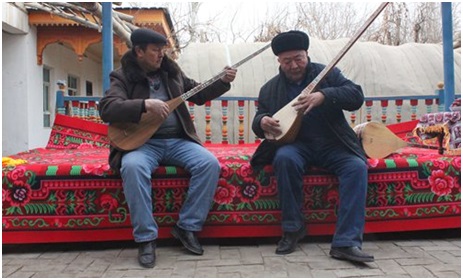“I learned how to make these musical instruments from my father when I was 15 years old, and he learned the skills from my grandfather. I earn a living from making these instruments, and I love the music,” Aiyiti said.
Aiyiti was born in 1954 in Jiayi village, Xinhe county in Aksu Prefecture, Northwest China’s
Xinjiang Uyghur Autonomous Region.“Jiayi” means “residents living along the road” in Uyghur, as all the houses in this village were built along the main road.
Because of his skill, Aiyiti stood out among them. He was named an inheritor of an intangible cultural heritage for making musical instruments of ethnic groups in Xinjiang in 2008, and has trained more than 80 apprentices in Xinhe county.
Visitors to Aiyiti’s house can see two rooms that have been converted into workshops, one for making musical instruments and one for displaying the completed ones. In one workshop, there are piles of wood and half-finished instrument parts, some resembling a large spoon.
Aiyiti pointed to one of the spoon-like pieces of wood and explained, “This is the Dutar, which is made of mulberry wood. We need to use a special chisel to make the wood into an oval-like shape on one side and make the other side hollow.”
Thanks to industrial advances, there is now no need to go to such lengths to produce strings. Aiyiti said that he can now buy the different strings he needs from markets that can guarantee their quality.
But he insists on making the other parts of different musical instruments by hand, and
asks all his apprentices to do the same. “Making musical instruments is a craft that needs to be carried forward to the next generation,” he said.Many households in Jiayi village are considered poverty-stricken families.
Aiyiti now has more than 10 apprentices learning how to make these instruments with him in his workshops. Many of them are from poverty-stricken families.
Aiyiti’s family also lived a very restricted life when his business selling handmade instruments was not doing well previously. But his circumstances improved after he was named an inheritor of the intangible cultural heritage for making musical instruments of ethnic groups.
Now, the income from his workshops is about 30,000 yuan a month, and his son has opened a shop in Xinhe county selling handmade instruments.
“I give more than 500 yuan to newcomers a month and offer a monthly salary of 4,000 to 5,000 yuan to apprentices who are more skillful. And we give them free meals,” Aiyiti said.
Aihmeti Rouzi is one of Aiyiti’s apprentices. “My family has no land. But now I am supporting my four-member family by making musical instruments,” he said.
For many families in Jiayi village, making musical instruments has become a way out of poverty.










Leave a Comment